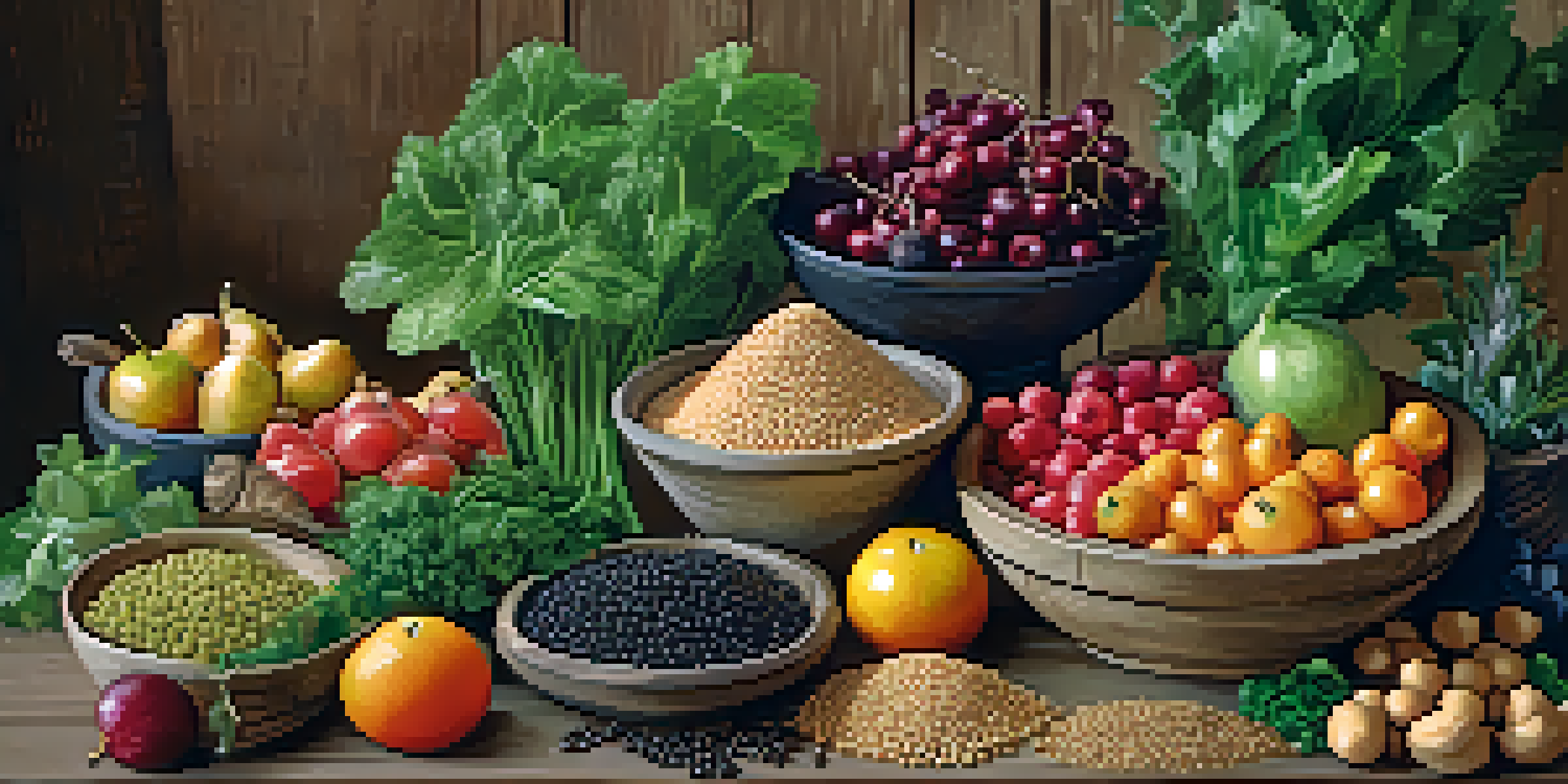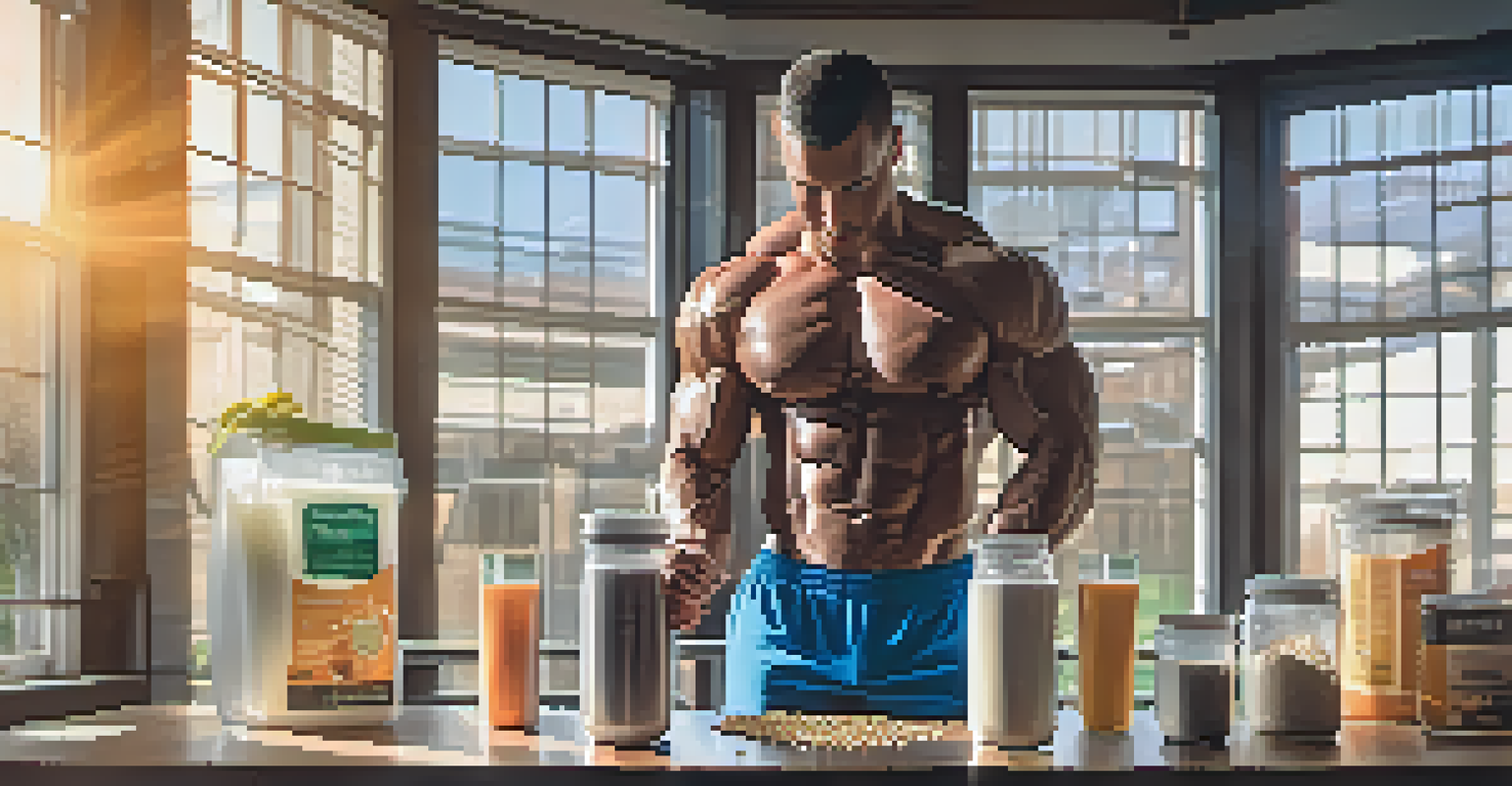The Impact of Plant-Based Diets on Bodybuilding and Sustainability

Understanding Plant-Based Diets and Bodybuilding
Plant-based diets primarily focus on foods derived from plants, including fruits, vegetables, grains, legumes, nuts, and seeds. For bodybuilders, this diet can seem daunting since protein intake is crucial for muscle repair and growth. However, these diets can provide sufficient protein when planned correctly, making them a viable option for those passionate about bodybuilding.
The food you eat can either be the safest and most powerful form of medicine or the slowest form of poison.
Many athletes are discovering that plant-based proteins, such as quinoa, lentils, and chickpeas, can effectively support their training goals. These sources not only deliver protein but also come packed with vitamins and minerals necessary for optimal performance. Transitioning to a plant-based diet might require some adjustments, but it can be rewarding both physically and mentally.
Moreover, adopting a plant-based diet can lead to improvements in recovery times and overall energy levels. By consuming a variety of whole foods, bodybuilders can ensure they’re getting the essential nutrients needed to fuel their workouts. It’s all about finding the right balance and being open to exploring new food options that can support both strength and endurance.
Nutritional Benefits of Plant-Based Diets for Athletes
One of the significant advantages of a plant-based diet is its nutrient density. Foods like leafy greens, fruits, and whole grains are rich in antioxidants, which help combat oxidative stress from intense workouts. These nutrients are essential for recovery and can help bodybuilders feel more energized after training sessions.

Additionally, plant-based diets are generally lower in saturated fats than animal-based diets, which can contribute to better heart health. This aspect is crucial for athletes, as a healthy heart supports overall performance. By prioritizing heart health through plant foods, bodybuilders can enhance their stamina and endurance in the gym.
Plant-Based Diets Aid Bodybuilding
With proper planning, plant-based diets can provide sufficient protein and nutrients to support muscle growth and recovery for bodybuilders.
Furthermore, a well-rounded plant-based diet often leads to better hydration levels. Many fruits and vegetables have high water content, aiding in recovery and reducing the risk of dehydration. Staying hydrated is vital in any training regimen, and incorporating these foods can make a significant difference in performance.
Plant-Based Protein Sources for Bodybuilders
When it comes to protein, bodybuilders might wonder if they can meet their needs without animal products. Fortunately, there are plenty of plant-based protein sources available. Legumes, such as beans and lentils, are excellent choices, boasting high protein content and fiber for digestive health.
Let food be thy medicine and medicine be thy food.
Seeds and nuts also pack a punch when it comes to protein. For instance, hemp seeds and chia seeds are not only high in protein but also offer healthy fats. Incorporating these into meals can enhance both the nutritional value and flavor of dishes, making it easier to stick to a plant-based regimen.
Additionally, whole grains like quinoa and brown rice provide a complete amino acid profile, crucial for muscle recovery. By combining different protein sources, bodybuilders can create balanced meals that support their training goals while enjoying a variety of flavors and textures.
Sustainability and the Environmental Impact of Diets
The environmental benefits of a plant-based diet are hard to ignore. Animal agriculture is one of the leading contributors to greenhouse gas emissions, deforestation, and water consumption. By shifting towards plant-based eating, individuals can significantly reduce their carbon footprint and contribute to a more sustainable planet.
Moreover, plant-based diets often require less land and resources compared to meat production. For instance, it takes far less water to produce vegetables than to raise livestock. Choosing to consume more plant foods can help preserve natural ecosystems and promote biodiversity, creating a healthier environment for future generations.
Sustainability Benefits Plant-Based Eating
Adopting a plant-based diet significantly reduces one's carbon footprint and promotes environmental sustainability, making it a responsible choice.
As more people adopt plant-based diets, there's potential for policy changes and industry shifts towards sustainable farming practices. Supporting local farmers and choosing organic options can further enhance sustainability efforts. Every meal choice contributes to the bigger picture of environmental health and sustainability.
Challenges of Adopting a Plant-Based Diet for Bodybuilders
Transitioning to a plant-based diet can come with its challenges, especially for bodybuilders accustomed to high-protein animal products. One common hurdle is ensuring adequate protein intake, which may require more planning and meal prep. However, with the right knowledge and resources, these challenges can be overcome.
Social situations may also pose difficulties, as not all restaurants or gatherings cater to plant-based diets. Bodybuilders might find themselves navigating menus carefully or bringing their own meals. Open communication with friends and family about dietary preferences can help ease these social dynamics.
Lastly, some individuals may experience digestive issues when increasing plant food intake due to higher fiber levels. Gradually introducing these foods and drinking plenty of water can help the body adjust. With patience and persistence, bodybuilders can find their way to a sustainable and effective plant-based approach.
Real-Life Examples of Successful Plant-Based Bodybuilders
Many well-known bodybuilders have successfully transitioned to plant-based diets, serving as inspiration for others. For instance, former Mr. Olympia competitor, Barny du Plessis, showcases how a plant-based diet can fuel impressive muscle growth and athletic performance. His journey highlights that with the right approach, strength and plant-based eating can go hand in hand.
Another notable example is Torre Washington, a vegan bodybuilder who has gained recognition for his physique and performance. Washington emphasizes that plant-based eating has not only supported his bodybuilding goals but also improved his overall health. His story demonstrates that anyone can thrive on a plant-based diet, regardless of their fitness aspirations.
Successful Plant-Based Bodybuilders
Numerous bodybuilders, like Torre Washington, demonstrate that a plant-based diet can effectively support strength training and overall health.
These examples serve as a testament to the fact that plant-based diets can successfully support bodybuilding endeavors. With the right mindset and dedication, anyone can reap the benefits of both a strong physique and a sustainable lifestyle.
Conclusion: The Future of Bodybuilding and Plant-Based Diets
As awareness of health and environmental issues continues to grow, the future of bodybuilding may increasingly embrace plant-based diets. Athletes are recognizing the numerous benefits, not only for their bodies but also for the planet. This shift could lead to a new generation of bodybuilders who prioritize sustainability and health in their training regimens.
The combination of effective nutrition from plant-based sources and a commitment to sustainability can create a powerful narrative for aspiring athletes. By showcasing the potential of plant-based diets in bodybuilding, more individuals may be encouraged to explore this path. It’s an exciting time for health-conscious individuals looking to make a positive impact.

Ultimately, transitioning to a plant-based diet doesn’t mean sacrificing strength or performance. With the right knowledge and resources, bodybuilders can thrive on these diets while contributing to a more sustainable future. The journey towards plant-based bodybuilding is not just a trend; it’s a movement towards healthier living and a healthier planet.